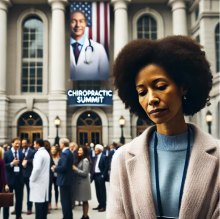
As the trial of Keita Vanterpool DC against the Federation of Chiropractic Licensing Boards (FCLB), Carol Winkler, and Karlos Boghosian progresses, the jurors' questions from day two highlight the critical importance of the Chiropractic Summit in this case. The questions directed at Jon Schwartzbauer and Daniel Cote reveal the jurors' keen interest in understanding the dynamics and protocols surrounding the Chiropractic Summit group, which lies at the heart of Vanterpool's suspension.
Juror Questions to Jon Schwartzbauer
- In previous years was the vice president normally invited to the Chiropractic Summit?
- In the past 10 years, how many times was the Vice President invited to the Chiropractic Summit?
- Was Dr. Vanterpool reimbursed for the Chiropractic Summit or did she pay out of her own pocket?
- Chain of command question: If the Board president does not answer a request or answer an email for a request to go to the Chiropractic Summit meeting, can Dr. Vanterpool go to anyone else for permission to attend?
Juror Questions to Cote
- Typically who are guests at Chiropractic Summit meetings?
- Is it unusual for FCLB members, including board of directors, to attend the Chiropractic Summit as a guest?
The Central Role of the Chiropractic Summit
The jurors' inquiries underscore the pivotal role the Chiropractic Summit plays in this case. Their questions reflect a curiosity about the established norms and deviations concerning the Summit's invitations and attendance, particularly focusing on Vanterpool's attempts to secure a "seat at the table". These questions are critical in understanding whether Vanterpool's actions were out of line with past practices or if her treatment was indeed discriminatory.
They are even more intriguing when one understands that not everyone in the profession is allowed to attend or participate in the Chiropractic Summit as it is a self selected group involved in making trade decisions within chiropractic.
Attempts to contact the leadership of the Chiropractic Summit have gone unanswered.
The Larger Picture: FCLB and the Chiropractic Cartel
The FCLB's involvement in the Chiropractic Summit is a key element in this trial. The FCLB, as part of the group of private corporations referred to by the US Department of Education as a "Virtual Cartel" operating as monopolies, holds significant sway over the profession, with close ties to other powerful entities such as the National Board of Chiropractic Examiners (NBCE) where the FCLB derives the bulk of its funding. These organizations, operating in a quasi-monopolistic manner, influence chiropractic education, licensure, and practice standards, often funded by student loans and state tax dollars.
The Chain of Command and Protocols
Jurors' questions about the chain of command and whether Vanterpool could seek permission from someone other than the Board president reveal an interest in understanding the internal procedures of the FCLB. This line of questioning is crucial in determining if Vanterpool's attempts to attend the Summit were handled fairly or if there was a breach of protocol used to justify her suspension.
Guests at the Summit
The inquiries about typical guests at the Chiropractic Summit and the usual attendance of FCLB members, including board directors, aim to clarify whether Vanterpool's request was unusual. This helps establish whether her exclusion was standard practice or if it indicates a discriminatory or retaliatory action by the FCLB.
Implications for the Chiropractic Profession
The jurors' focus on these questions highlights the broader implications of this case for the chiropractic profession. The secretive nature of the Chiropractic Summit, where key decisions and strategies are formulated, contrasts sharply with the need for transparency and inclusivity in professional governance. The trial underscores the tension between maintaining exclusive monopolistic control over the profession, concerns about restraint of trade and the push for openness and fair representation.
Conclusion
The jurors' questions about the Chiropractic Summit reveal their awareness of its central role in Vanterpool's case. These questions not only seek to uncover the specifics of Vanterpool's suspension but also probe the broader issues of transparency, fairness, and the influence of the Chiropractic Cartel. As the trial unfolds, the answers to these questions will be pivotal in determining the outcome and the future direction of the chiropractic profession.
CLICK HERE for more on the Vanterpool Case
